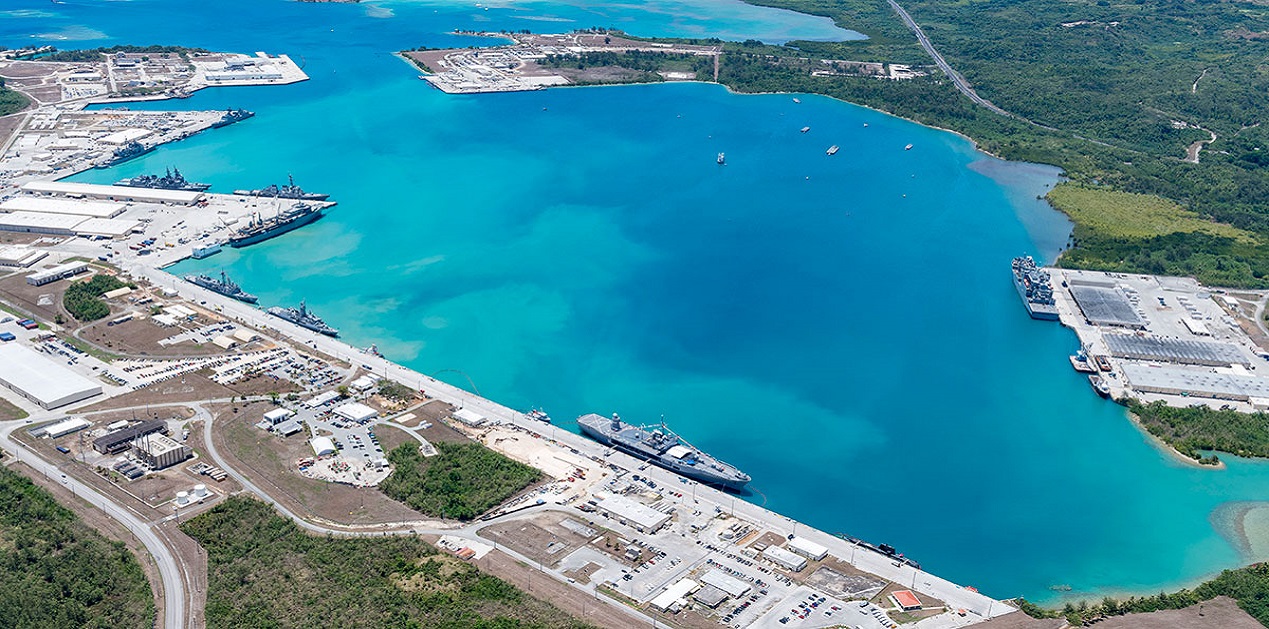Earlier this month, on 1st July, 350 paratroopers from the US 4th Infantry Brigade Combat Team (Airborne) parachuted onto Guam to test their ability to “execute real-world missions” and demonstrate that they could be deployed “anywhere in the U.S. Indo-Pacific Command area at a moment’s notice,”1 Embarked onboard multiple C-17 Globemasters, the paratroopers took a long flight from Joint Base Elmendorf-Richardson in Alaska for this Emergency Deployment Readiness Exercise (EDRE).
The EDRE is one of the many exercises and manoeuvers undertaken by the US military in the western Pacific Ocean during the last few weeks. Prominent among these are surveillance and reconnaissance air patrols over the South China Sea, Taiwan Strait and more recently over Bashi Channel south of Taiwan;2 forward-deployment of all submarines of the Pacific Fleet in the Western Pacific to simultaneously conduct “contingency response operations”; 3 deployment of three carriers in the Pacific Ocean; dual-carrier operations in the Philippines Sea; and the 28-hour mission by B-52 Stratofortress bomber launched from home station in Barksdale Air Force Base, Louisiana to participate in maritime integration exercise with the USS Nimitz and USS Ronald Reagan carrier strike groups.4 It is useful to mention that at least a pair of MQ-4C Triton autonomous, unmanned aircraft are deployed at Guam and these are conducting “fleet operations and training flights” in support of US Navy’s maritime domain awareness across the Indo-Pacific.5
These showcase US’ formidable capabilities and above all are clear signals of its commitment to keep the Indo-Pacific ‘free and open’ against any attempts by China to dominate the regional security matters, prevent intimidation of Taiwan by Beijing as also reassure countries who have disputes with China over the Spratly and Parcel Islands in the South China Sea. In response, the PLA Navy too has been quite proactive and conducted air/naval exercises. Both the US and China are also using these exercises as “strategic communication” in the absence of direct channels for exchanging messages.6
Meanwhile, Heino Klinck, Deputy Assistant Secretary for East Asia has conceded that although the National Defense Strategy clearly identified the primacy of the Indo-Pacific, the “budget numbers have not supported, to date, the Indo Pacific’s role as the primary theater.”7 Be that as it may, the US is reinforcing its military facilities in the western Pacific and Oceania.
In Guam, Marine Corps Base Camp Blazis being set up. A large tract of land close to the Andersen Air Force Base has been cleared which will house permanently over a thousand Marines and support many thousands coming to the island on rotational basis.8 Beginning in 2025, about 5,000 Marines from Okinawa are also scheduled to relocate to Camp Blaz, and the move is expected to cost about $8 billion, with Japan providing about $2.8 billion. 9 The defense authorization bill for fiscal 2020 included $226 million for the Navy and $65 million for the Air Force for military related construction projects in Guam. 10 It is worth mentioning that Guam is a small island of 32 miles in length and is home to 170,000 inhabitants.
The US has also announced plans to build a “defensive ring around Guam” for which Admiral Phil Davidson, Commander U.S. Indo-Pacific Command has sought fiscal support for a “360-degree persistent and integrated air defense capability in Guam” and stated that “America’s day begins in Guam and is not only a location we must fight from, but we must also fight for — given future threats,”11 clearly aimed at deterring any Chinese military action in the region.
For Hawaii, the National Defense Authorization Act (NDAA) for fiscal year 2021 provides “additional funding for missile defense priorities, including the Hypersonic and Ballistic Tracking Space Sensor, components for an eight Terminal High Altitude Area Defense (THAAD) battery, Homeland Defense Radar-Hawaii, and additional SM-3IIA interceptors”. 12
Similarly, military infrastructure at Wake atoll13 in the Pacific Ocean (about halfway between Hawaii and Japan) is being revitalized. A US military official has observed that “Wake Island has always been a geographically important location for military activities, including refueling…The re-investments done of late are not to increase activity or capacity but rather replace aged infrastructure.
The atoll accrues strategic value as being part of the “layered missile defense system” against advanced missiles being developed by “near-peer competitors” such as China14 and North Korea which boasts of sending its missiles across the Pacific at targets in mainland US. The atoll has a powerful radar and in 2019, the US tested its effectiveness against an incoming intercontinental ballistic missile (ICBM) launched from Kwajalein island which was tracked by a radar at Wake along with another radar at a different location in the Pacific Ocean; the ICBM was destroyed by ground based interceptors in California.15
Besides Wake atoll, there are a number of tiny islets such as Tinian and Pagan near Guam which serve as “flexible forward operating bases” or ‘Lilly Pads’16 and support US military operations in the Pacific Ocean. Tinian was at the forefront during World War II and it was from here US launched its B-29 bombers that dropped the atomic bombs on Japan. This airfield is being revamped at cost of $20 million and will be used for operations by KC-130 aerial refueling/transport aircraft; but the facility is not “user-friendly for a lot of jet airplanes,” 17 Likewise the US is pursuing an agreement with authorities of Commonwealth of the Northern Mariana Islands to use the island of Pagan as a diversionary airfield. The agreement would allow the US Air force “to build an airfield to serve as a backup in the event Guam's Andersen Air Force Base is damaged or otherwise unavailable”.18
Another avenue for US to augment its combat capability in the Pacific Ocean is through Visiting Forces Agreement. There is now a glimmer of hope for the 1988 Visiting Forces Agreement (VFA) between US and Philippines to remain buoyant and allow resumption of access by US military aircraft and vessels into the Philippines military facilities such as Clark Air Base and Subic Bay Naval Base. The Philippines fits well into the US’ redefined naval strategy focused on Sea Control supported by Distributed Maritime Operations, to challenge the galloping naval power of China. Small units of Marines armed with precision missiles such as the Tomahawk cruise missiles could assist the U.S. Navy to gain control of the seas, and the emerging Ghost Fleet comprising of unmanned vehicles will counter Chinese maritime A2/AD capabilities. 19
As far as Australia is concerned, since 2012, more than 6,800 US Marines have served in Darwin to train alongside the Australian Defense Force. The rotational force reached its full complement of 2,500 Marines for the first time by July 2019.20 Cocos (Keeling) Island of Australia is a “key strategic force multiplier for both Australian and allied-use”21 and can potentially serve as a staging point for many of US military aircraft.
Vietnam offers attractive access and basing options to the US military; however, experts argue that Hanoi may not be inclined to make such an offer due to its “long-standing defense policy of “three no’s” dating back to its first Defense White Paper in 1998”. This is notwithstanding the fact that “Vietnam’s 2019 White Paper raised the tantalizing prospect that Vietnam might consider altering its “three no’s” defense policy”.22
The National Defense Authorization Act (NDAA) for fiscal year 2021 makes note of the December 6, 2019 U.S.-Singapore Memorandum of Understanding to “establish a fighter jet training in Guam and encourages the Secretary of Defense to explore the merit and feasibility of future agreements”.23
The above narrative is a clear indicator that the US has serious plan to build military infrastructure in the Pacific Ocean and it is fair to argue that it would explore Visiting Forces Agreements or similar such arrangements with many other countries particularly in Southeast Asia who have expressed concern over Chinese activities and serious incidents that have “eroded trust and confidence, increased tensions and may undermine peace, security and stability in the region”.24
US could even to invite other partners such as India to explore engagements in South China Sea under the three foundational agreements i.e. Logistics Exchange Memorandum of Agreement (LEMOA); Communications Compatibility and Security Agreement (COMCASA); and Basic Exchange and Cooperation Agreement (BECA).
Endnotes
- “Hundreds of Alaska-based paratroopers drop on Guam in show of readiness amid pandemic”, https://www.stripes.com/news/pacific/hundreds-of-alaska-based-paratroopers-drop-on-guam-in-show-of-readiness-amid-pandemic-1.635778 (accessed 05 July 2020).
- As on 05 July 2020, the US had conducted reconnaissance for 13 consecutive days in the Bashi Channel (a waterway between the Philippines’ Y’Ami Island and Taiwan’s Orchid Island) before heading to the South China Sea. For more details see “Operation Bashi Channel: the next flashpoint in the China-US military rivalry” https://www.scmp.com/news/china/diplomacy/article/3091879/operation-bashi-channel-next-flashpoint-china-us-military?utm_medium=email&utm_source=mailchimp&utm_campaign=enlz-scmp_china&utm_content=20200706&MCUID=b3645f6aaf&MCCampaignID=31961a3c30&MCAccountID=3775521f5f542047246d9c827&tc=17(accessed 06 July 2020).
- “Pacific Fleet Submarines: Lethal, Agile, Underway”, https://www.navy.mil/submit/display.asp?story_id=112909 (accessed 06 July 2020).
- “USAF B-52 Conducts Maritime Integration Exercise with 2 US Navy CSG in the South China Sea”, https://www.navalnews.com/naval-news/2020/07/usaf-b-52-conducts-maritime-integration-exercise-with-2-us-navy-csg-in-the-south-china-sea/(accessed 07 July 2020).
- “Navy MQ-4 Triton Flying Operational Missions from Guam”, https://news.usni.org/2020/05/12/navy-mq-4-triton-flying-operational-missions-from-guam(accessed 06 July 2020).
- “Operation Bashi Channel: the next flashpoint in the China-US military rivalry” https://www.scmp.com/news/china/diplomacy/article/3091879/operation-bashi-channel-next-flashpoint-china-us-military?utm_medium=email&utm_source=mailchimp&utm_campaign=enlz-scmp_china&utm_content=20200706&MCUID=b3645f6aaf&MCCampaignID=31961a3c30&MCAccountID=3775521f5f542047246d9c827&tc=17 (accessed 06 July 2020).
- “Support Swells For New Indo-Pacom Funding; Will Money Follow”, https://breakingdefense.com/2020/05/support-swells-for-new-indo-pacom-funding-will-money-follow/(accessed 06 July 2020).
- “New base expected to host thousands of Marines begins to take shape on Guam” https://www.stripes.com/news/pacific/new-base-expected-to-host-thousands-of-marines-begins-to-take-shape-on-guam-1.622106(accessed 06 July 2020).
- “Military spent $210.2M on Guam buildup last fiscal year”, https://www.guampdn.com/story/news/2020/02/05/guam-dod-military-budget-defense-funding-2019-fiscal-year/4663732002/(accessed 06 July 2020).
- “$743B proposed for defense spending”, https://www.postguam.com/news/local/b-proposed-for-defense-spending/article_cc375146-1c0c-11ea-b0eb-0b45672f030f.html(accessed 06 July 2020).
- “Inside US Indo-Pacific Command’s $20 billion wish list to deter China — and why Congress may approve it”, https://www.defensenews.com/global/asia-pacific/2020/04/02/inside-us-indo-pacific-commands-20-billion-wish-list-to-deter-china-and-why-congress-may-approve-it/(accessed 06 July 2020).
- “Fiscal Year 2021: National Defense Authorization Act (NDAA)” https://www.armed-services.senate.gov/imo/media/doc/FY%2021%20NDAA%20Summary.pdf(accessed 06 July 2020).
- It is a tiny coral atoll measuring 5-square-mile and had remained uninhabited for centuries but is now marginally habitable. It had no water supply and residents relying on rain water and reverse osmosis.
- “The US Military Is Pouring Hundreds Of Millions Of Dollars Into Tiny Wake Island” https://www.civilbeat.org/2019/10/the-u-s-military-is-pouring-hundreds-of-millions-of-dollars-into-tiny-wake-island/(accessed 06 July 2020).
- Ibid.
- These are “small, secretive, inaccessible facilities with limited numbers of troops, spartan amenities, and prepositioned weaponry and supplies”
- “Marines to Rebuild WWII B-29 Airfield on Tinian for Training Use”, https://seapowermagazine.org/wwii-b-29-airfield-for-training/(accessed 06 July 2020).
- “CNMI, Navy discussions about Pagan remain on back burner”, https://www.floridatoday.com/story/news/2019/08/29/cnmi-governors-office-no-plans-discussions-navy-pagan/2148976001/(accessed 06 July 2020).
- “Philippines Infuses New Life in its Relationship with the US”, http://www.kalingainternational.com/Dr-Vijay-Sakhuja8.html(accessed 06 July 2020).
- “U.S. Security Cooperation with Australia”, https://www.state.gov/u-s-security-cooperation-with-australia/ (accessed 06 July 2020).
- “Australia’s own Indo-Pacific fortress – The case for redeveloping Cocos Islands”, https://www.defenceconnect.com.au/key-enablers/4124-australia-s-own-indo-pacific-fortress-the-case-for-redeveloping-cocos-islands(accessed 06 July 2020).
- “Will Vietnam Lease Cam Ranh Bay to the United States?”,https://thediplomat.com/2020/05/will-vietnam-lease-cam-ranh-bay-to-the-united-states/ (accessed 06 July 2020).
- “Fiscal Year 2021: National Defense Authorization Act (NDAA)” https://www.armed-services.senate.gov/imo/media/doc/FY%2021%20NDAA%20Summary.pdf(accessed 06 July 2020).
- “Chairman’s Statement Of The 36th ASEAN Summit”, https://asean.org/storage/2020/06/Chairman-Statement-of-the-36th-ASEAN-Summit-FINAL.pdf (accessed 06 July 2020).
(The paper is the author’s individual scholastic articulation. The author certifies that the article/paper is original in content, unpublished and it has not been submitted for publication/web upload elsewhere, and that the facts and figures quoted are duly referenced, as needed, and are believed to be correct). (The paper does not necessarily represent the organisational stance... More >>











Post new comment